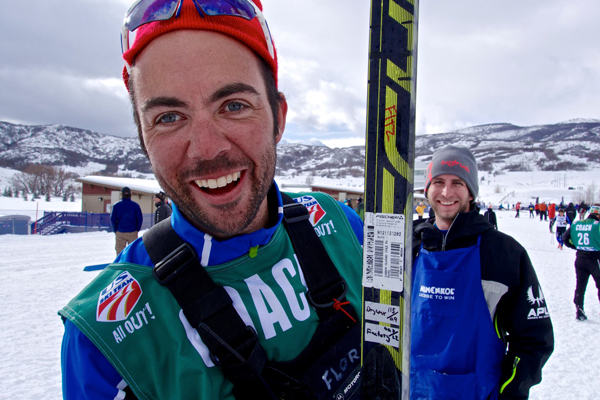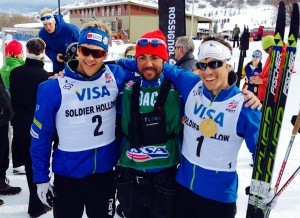
Most Alaskans know who Olympic skier Kikkan Randall is. But can you name her Alaskan Pacific University coach? His name is Erik Flora. He’s a workaholic who is enthusiastic, passionate and motivated. And he deserves more than a little credit for the dramatic turn around the U.S. cross country ski team has managed in the last decade.
It’s a freezing cold morning at Hatcher Pass. The sun won’t hit the cross country ski course for at least another hour and a steady wind is making things unpleasant. But as Coach Erik Flora starts directing the morning’s time trial, he appears to be enjoying himself.
Flora has reason to be in a good mood.
When he became the director of Alaska Pacific University’s nordic program in 2006 he coached one young Olympian- Kikkan Randall- and a handful of other promising athletes. Now four of the 14 members of the U.S. Cross Country Olympic team are from APU. In less than a decade, Flora has helped transform the idea of what’s possible in cross country skiing. The only American to win an Olympic medal in the sport was Bill Koch nearly forty years ago. For Flora, it didn’t add up:
“We’re Americans. Hard working, lot’s of ingenuity. But for some reason in Cross Country skiing, we just weren’t doing it.”

Flora had hoped to go to the Olympics himself. But a car accident at Hatcher Pass in 1999 left him with a career ending back injury.
“It was a pretty devastating experience. I had kind of worked my whole life toward this high level skiing and Olympic goal and then all of the sudden, it was taken away.”
At first, Flora thought he was done with the sport for good. He took a job with an air taxi at Lake Hood, to pursue his airplane mechanics license and become a pilot. For a few winters, Flora barely touched his skis. But then Alaska Pacific University convinced him to teach masters athletes for about six hours a week. That part time job sparked a new passion for Flora- coaching:
“It was amazing, being able to pass along what I had learned and to help someone forward. I could see that’s what I wanted to do.”
In 2002, Flora went to Salt Lake City to watch the Olympics. A friend from Norway, Tor Arne Hetland, was competing in the Skate Sprint that year. Flora met Hetland during a year he spent in Norway after High School, training with some of the country’s best young skiers. In Salt Lake City, Hetland won gold. The moment was life changing for Flora:
“You know it’s possible for someone to win a medal. But you’ve never seen it, you’ve never had breakfast with them. They don’t seem like they’re human. Being friends first with this athlete… and then all of the sudden he wins a gold medal. It’s like, ‘wait a second, I can do that.'”
Flora went skiing the next day and plotted his own comeback in the sport. When that plan fell apart, he turned his attention to taking his coaching to the next level. Kikkan Randall was already a two time Olympian and gaining ground on the World Cup. When Flora took over as her coach in 2006 he began boosting the amount she was training, by more than 30% by the end of the first year:
“We didn’t have a recipe book on how this works. We didn’t have a manual on how to build this. But we kept on experimenting and trying to learn and find the key components.”
A year later, in 2007, Randall won her first World Cup Medal- a bronze in the skate sprint in Rybinsk, Russia. In the years since, she’s steadily improved, racking up 10 World Cup gold medals. Flora also coached Holly Brooks’ improbable transition from ski coach to Olympic level athlete. Now siblings Sadie and Erik Bjornsen are heading to their first Olympics under Flora’s direction. Luke Bodensteiner, a former teammate who is now vice president for athletics for the U.S. Ski and Snowboard Association says Flora is getting results:
“He really raised the bar. He’s demanded a lot from his athletes. He’s shown them not only how to do really big amounts of training, but how to do it wisely. How to put a premium on recovery.”
Bodensteiner says even as Flora pushes his athletes hard, he’s remarkably easy going and always has a positive attitude. That’s how Holly Brooks sees it too, from her point of view as one of his skiers, who also used to coach with him:
“He just exudes passion. It could be raining sideways. We could be hypothermic, hungry and he would still be jumping out of his socks excited. He’s just an incredible motivator.”
Flora says it turns out he’s a far better coach than athlete. Now he’s heading to Sochi with a team of medal contenders. And the formula is starting to look pretty simple to him:
“I always felt like there had to be some kind of secret process that had to take place to have this international success that we’re having. And it’s funny, the more success we have, the easier it feels.”
Looking back, Flora says the car accident at Hatcher Pass may have been the best thing that ever happened to him. And in Sochi, he’ll probably be the coach who looks like he’s having the most fun on the side of the trail.
Annie Feidt is the broadcast managing editor at Alaska Public Media. Reach her at afeidt@alaskapublic.org. Read more about Annie here.





